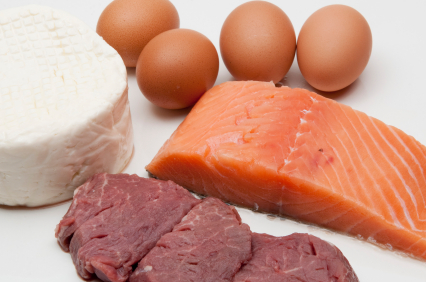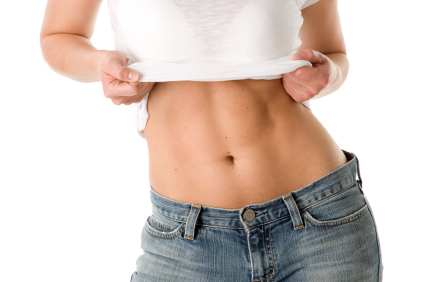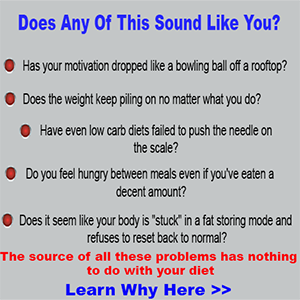B-vitamins Blast Body Fat
To win the war against excess body fat, the B-vitamins are your best friends.
They’re a component of good nutritional habits that help your body make energy from food.
And, when you make more energy from food, you can use this energy to ignite fat cells on fire and stay lean and fit.
Here we’re going to look at three special B-vitamins that complement your fat-loss quest, while keeping you healthy and strong. But first, let’s look at what B-vitamins exactly are.
Your BFF: The B-vitamins
The B-vitamins are water-soluble vitamins. This means that they’re excreted in urine and can be quickly depleted from your body. Because water-soluble vitamins are not stored in the body in appreciable amounts and are depleted very fast, it’s important that we eat foods rich in these vitamins or supplement to maintain adequate levels.
There are eight B-vitamins, which include thiamine (B1), riboflavin (B2), niacin (B3), pyridoxine (B6), folic acid (B9), cyanocobalamin (B12), pantothenic acid, and biotin.
These vitamins act as coenzymes - compounds that act as catalysts in chemical reactions that transfer energy from basic food elements to the body. They are essential for the breakdown of carbohydrates into glucose, which provides us energy; and the breakdown of fats and proteins, which aids the normal functioning of our nervous system and healthy hair, skin, and nails.
Since these vitamins affect such important elements of your body, you have to ensure you get them in daily. Some of these B-vitamins are also particularly important for an ideal body composition and fast metabolism, as you’ll see below.
Pyridoxine: Vitamin B6
Vitamin B6, an important B-vitamin that exists in three chemical forms (pyridoxine, pyridoxal, and pyridoxamine), is necessary for proper protein metabolism. The coenzyme form of B6 is associated with more than 100 enzymes, which are critical for amino acid breakdown from protein foods and conversion to other amino acids.

This coenzyme also helps your body use glycogen found in muscle cells for energy, which is especially important when you’re exercising hard. Without glycogen for energy, your muscles wouldn’t move very far. Glycogen breakdown is also important for proper blood sugar maintenance, which is critical if caloric intake is low, such as when you’re dieting.
Another important function of B6 is the ability to diminish the actions of glucocorticoid hormones such as cortisol; this is critical in times of stress (like exercising and dieting) so your body does not store extra body fat and use precious muscle protein for energy.
Because B6 is so important for protein metabolism, its requirement depends on the amount of protein you consume on a daily basis. An intake of ~0.016 mg vitamin B6/1 gram of protein is considered by the National Academy of Sciences to meet the needs of adults under normal conditions – this corresponds to about 1.6 mg of B6 for every 100 g of protein.
However, for athletes and people that exercise regularly (and often eat more protein), vitamin B6 requirements may be higher given the greater need for energy and protein metabolism. Scientific studies have shown that exercise greatly depletes B6 levels in the body and needs to be keep in check (Guilland JC et al; Rokitzki L et al).
As you can see, when you’re an active person consuming more protein than the” Average American,” your needs for vitamin B6 are increased, and it’s critical you get at least the minimum amount in each day.
Some of your best food sources of B6 include fortified cereals, potatoes, bananas, chickpeas, and chicken (contain ~ 0.5-0.7 mg), but if you’re not eating those foods and/or are very active, you’d benefit from supplemental sources.
Cobalamins: Vitamin B12
Vitamin B12 is a collection of compounds that consists of various forms of cobalamin molecules. These different molecules all contain the rare element cobalt, and the most common is the B12 vitamin known as cyanocobalamin.

The coenzyme forms of B12 work in the body to maintain normal brain and nervous system development and function, in addition to influencing DNA synthesis and regulation. They also play an important role in the metabolism of fatty acids and creation of energy from foods containing fats.
People lacking B12 in their diet complain of fatigue, depression, and poor memory, in addition to having cracks on the sides of their mouths (known as angular cheilitis). The cause of this tiredness and skin damage is partly related to B12’s role in red blood cell production and prevention of anemia.
Athletes and hard exercisers may have low body B12 status, due to increased metabolism and demand for this vitamin to repair damaged blood cells and injured muscle tissue, and to carry more oxygen around in the blood while exercising. As such, their requirement is more than the Average Joe, which is said to be ~2.4 mcg/day.
The uniqueness of Vitamin B12 is that it’s only found in animal foods, like dairy, meat, eggs, fish, and poultry. Foods highest in B12 are shellfish (mussels, lobster), fin fish (trout, salmon, tuna), and organ meats (liver). Thus, vegetarians, or people that eat none of these foods, must add supplements to prevent deficiency, while athletes benefit from supplements because of their greater needs.
Biotin
Biotin is an essential cofactor for several key enzymes in the production and metabolism of glucose, fat, and protein. For example, in glucose production from the liver (gluconeogenesis), an enzyme called pyruvate carboxylase requires biotin for proper function.
Biotin is also needed for the breakdown of the branch chain amino acids from protein (leucine, isoleucine, and valine), and odd chain fatty acids from fat-containing foods.
People who exercise often have increased need for biotin for several reasons:
• Increased turnover, metabolism, and loss of this vitamin in urine or sweat
• Increased mitochondrial enzymes that require more biotin for cofactors
• Increased need for tissue repair and maintenance
• Increased food intake requiring biotin for metabolism

Biotin is found in small amounts in many foods, but the richest sources are cooked eggs (raw egg whites bind biotin due to the protein avidin). The average person needs at least 30 mcg of biotin each day, but there is no toxicity from higher intakes, especially in people who need more.
B-vitamins = Body-vitamins
As you can see, ideal intake of these B-vitamins helps give your body the energy to exercise hard, so that you can burn more fat and build more lean muscle. If you’re constantly tired because your metabolism is sluggish, you can’t create the right energy from the food you eat. In turn, you won’t be able to rid your body of excess body fat or achieve a lean, strong physique. So, eat a good diet and take your B-vitamins. Your body will thank you.

References
Vitamin status of young athletes including the effects of supplementation.
Guilland JC, Penaranda T, Gallet C, Boggio V, Fuchs F, Klepping J.
Med Sci Sports Exerc. 1989 Aug;21(4):441-9. Review.
Acute changes in vitamin B6 status in endurance athletes before and after a marathon.
Rokitzki L, Sagredos AN, Reuss F, Büchner M, Keul J.
Int J Sport Nutr. 1994 Jun;4(2):154-65.
About Jayson Hunter & Jaylab Pro

Jaylab Pro was founded by Registered Dietitian Jayson Hunter. Jayson has been recognized as one of America's foremost weight loss experts by America's Premier Experts™. He has also been featured in USA Today for this accomplishment. Jayson is also a best-selling author having co-authored multiple books in health & fitness and business growth. Jayson and the Jaylab Pro team are proud to create content that helps improve the lives of millions of people around the world. We hope you enjoy it just as much as others have.
 If you order a JayLabPro SmartShip product or any Combo Package, we will automatically ship you a new supply of the product or products you have ordered every month, starting 30 days after your initial order is shipped, and continuing until you cancel. The credit card you are using today will be billed the lowest available price for those product or products when your order is shipped, but shipping will be FREE. You may log into your customer account or call our customer service department toll-free at 1-888-9GETPRO (1-888-943-8776) between the hours of 8am – 9pm EST Mon-Fri to cancel future shipments, customize the timing of your shipments, or change the credit card used for billing.
If you order a JayLabPro SmartShip product or any Combo Package, we will automatically ship you a new supply of the product or products you have ordered every month, starting 30 days after your initial order is shipped, and continuing until you cancel. The credit card you are using today will be billed the lowest available price for those product or products when your order is shipped, but shipping will be FREE. You may log into your customer account or call our customer service department toll-free at 1-888-9GETPRO (1-888-943-8776) between the hours of 8am – 9pm EST Mon-Fri to cancel future shipments, customize the timing of your shipments, or change the credit card used for billing.










